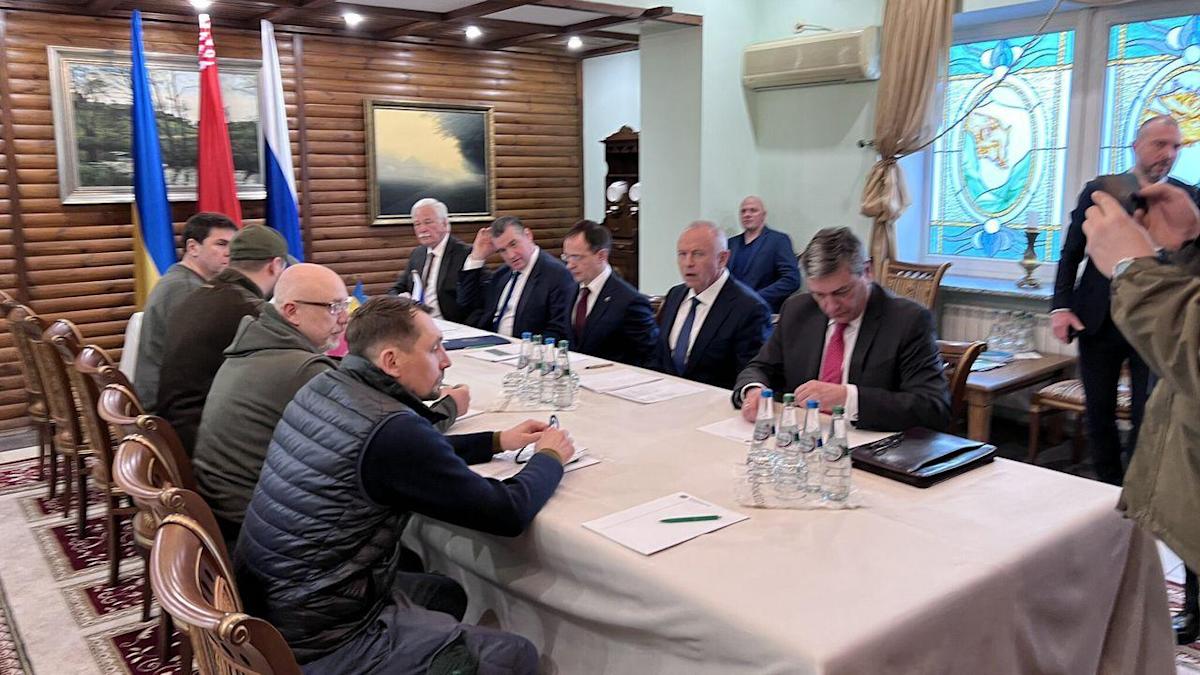
Russian and Ukrainian delegations convened near the Ukraine-Belarus border for a second round of peace talks on Thursday, even as Russian President Vladimir Putin continued to signal his commitment to continuing the invasion.
What they’re saying: The Ukrainian side is seeking a ceasefire and humanitarian corridors to evacuate civilians from towns and cities that have come under attack, said Mykhailo Podolyak, a member of the Ukrainian delegation and an adviser to President Volodymyr Zelensky.
Get market news worthy of your time with Axios Markets. Subscribe for free.
The latest: In a press conference on Thursday, Zelensky called on Putin to “sit down with me” and negotiate at the head-of-state level, asking: “What are you afraid of?”
A call earlier on Thursday between Putin and French President Emmanuel Macron underscored the remote prospects of a swift diplomatic resolution.
-
Putin stuck by his demands for the “demilitarization and neutrality of Ukraine,” which he said would be accomplished “whatever happens,” the Kremlin noted. If Kyiv won’t cut a deal, Putin added, Russia will only add to its demands.
-
A French official told reporters after the call that it appears “Russia’s ambition is indeed to take control of all of Ukraine.”
Flashback: A previous round of talks on Monday ended without a breakthrough. Putin’s spokesman, Dmitry Peskov, said the Russian side was ready to meet again sooner but believed the Ukrainians were stalling.
-
Zelensky told CNN on Tuesday that the talks would be a waste of time unless the fighting stopped and Russian forces retreated to their positions from before the invasion.
-
But an adviser to Zelensky told Axios the Ukrainian side would push for a partial ceasefire to address the humanitarian disaster.
-
The two delegations greeted each other cordially and shook hands before sitting down for the talks.
Between the lines: Richard Haass, president of the Council on Foreign Relations, tells Axios that Putin’s demands indicate that he is not currently serious about diplomacy.
-
That will only change if Putin comes under sufficient pressure at home — due to battlefield casualties and economic losses — that he feels continuing the war is more perilous for him than ending it, Haass says.
-
Rep. Adam Smith (D-WA) is among those arguing that the U.S. should set out the circumstances under which sanctions would be lifted in order to provide Putin with an off-ramp.
-
Others take a harder line. Radek Sikorski, a Polish politician and chairman of the European Parliament’s EU-USA delegation, told Axios the goal of Western sanctions should now be regime change in Moscow.
The big picture: Outside of the negotiating room, every indication is that this war will continue to escalate. Russia is bombarding Ukrainian cities while Ukrainian officials vow to fight on until victory.
-
If diplomacy fails, this war could continue until the end of Ukrainian independence or the end of Vladimir Putin’s regime.
-
The path to either outcome would likely be long and incredibly destructive. But at present, no other outcome looks particularly likely.
Like this article? Get more from Axios and subscribe to Axios Markets for free.




